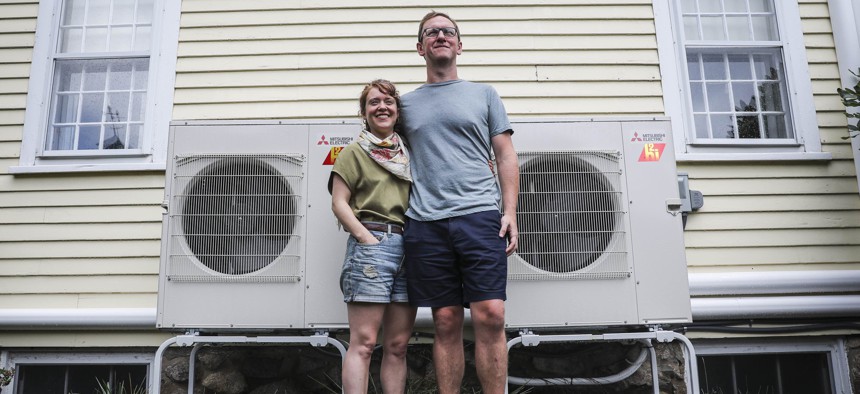States at Center of Battle Over Gas Furnaces and Stoves

A Massachusetts couple with the heat pumps they had installed in their home. Erin Clark/The Boston Globe via Getty Images
Moved by environmental and health concerns, action by state officials to ban natural gas in buildings is heating up. But the plans are also sparking opposition.
Lawmakers and regulators in Democratic states are moving to ban natural gas stoves and furnaces in newly constructed buildings, as they grow increasingly worried about the effect of the fossil fuel on human health and the global climate.
About 13% of the country’s greenhouse gas emissions come from buildings, and about 80% of that pollution is generated by natural gas, making it a frequent target for environmentalists. Policy makers are also growing wary of the health implications of burning methane in homes. A study released in December attributed nearly 13% of childhood asthma to the use of gas-burning stoves.
But on the other side of the debate, building industry and gas utility groups are raising opposition, citing concerns that the new restrictions will push up construction costs in places where affordable housing is already in short supply, or cause reliability issues with the electric grid. Steamfitter and plumber unions, too, have voiced concerns, warning of potential job losses if gas systems are phased out.
State governments are at the center of the debate because of the role they can play moving their states to renewable power sources, their authority over local governments that might want to limit natural gas appliances, and because they can help individuals take advantage of new federal incentives to reduce energy use.
“We view this as a key moment for governors in particular,” said Justin Backal Balik, the state program director for Evergreen Action, an environmental policy advocacy group that grew out of Washington Gov. Jay Inslee’s presidential campaign. “There’s an imperative for state governors in particular to go further and faster on this issue than they ever have before.”
Growing List of Proposals and Mandates
New York Gov. Kathy Hochul, a Democrat, renewed her push to ban natural gas hookups for new construction during her state of the state address on Tuesday. It’s the second year Hochul put that goal on her legislative agenda. She also called for banning the sale of furnaces and heating equipment that use fossil fuels.
“We know that the key to long-term sustainability—for our wallets and our planet—is weaning ourselves from fossil fuels,” she said. “We are taking these actions because climate change remains the greatest threat to our planet, and to our children and grandchildren.”
Her proposal comes after New York City imposed a ban for natural gas hookups in the waning days of former Mayor Bill de Blasio’s administration. The prohibition will start to take effect in December.
Hochul’s proposal faces an uncertain future in Albany. Petroleum companies and gas utilities fought a similar measure last year, and the legislation ultimately stalled.
Meanwhile, the agency in charge of building codes in Washington state imposed rules in November that will require new homes and smaller apartment buildings to be heated with heat pumps starting in July. (The homes could still be allowed to have natural gas furnaces as a back-up for extreme weather.) The Washington State Building Code Council also mandated in April that commercial buildings and larger multifamily developments had to use the electric heating devices.
While the move pleased environmental advocates, it drew sharp opposition from other quarters.
“This decision will drive up the cost of housing into the future with no tangible return,” Greg Lane, executive vice president of the Building Industry Association of Washington said in November after the council approved the heat pump mandate.
“Requiring heat pumps does nothing to reduce reliance on fossil fuels,” he added. “Washington already consumes less natural gas than roughly half the nation. The electric power sector is the largest natural gas user in the state.”
Across the country in Massachusetts, then-Gov. Charlie Baker last summer signed a climate law that allowed up to 10 municipalities to ban or restrict natural gas use in new buildings, following an effort from a Boston suburb to do so that was ruled illegal. The Republican governor admitted the provision gave him “agita” but signed the sweeping legislation anyway.
Gov. Maura Healey succeeded Baker this month, giving Democrats full control of state government there and raising the possibility that lawmakers could let more cities—including Boston—impose bans.
The California Air Resources Board in September voted to ban the sale of gas furnaces and water heaters starting in 2030.
A National Debate
Nationally, nearly 100 cities have passed laws to block gas-powered furnaces and heaters.
On the other hand, 20 states—mostly in the South and the Midwest—have prohibited local governments from passing restrictions on natural gas.
The federal government could soon weigh in, too.
A commissioner for the U.S. Consumer Product Safety Commission told Bloomberg that the agency could ban gas stoves because of the health hazards they pose. Advocates have asked the Department of Housing and Urban Development to remove gas stoves in public housing. The Sierra Club and two dozen other environmental groups asked the Environmental Protection Agency in August to ban natural gas appliances.
The natural gas industry has, of course, pushed back on such efforts.
“Any proposal that bans natural gas or natural gas appliances would be harmful to consumers and to the environment,” the American Gas Association said in a statement last year. “Natural gas is helping our nation achieve our environmental goals in real-time, and the data proves that out. Conversely, [a ban] would impose undue burdens on consumers at every step of the process.”
Jessica Tritsch, the Sierra Club’s campaign director for building electrification, said the group is focusing much of its lobbying on new construction instead of existing buildings.
“The first thing you have to do when you’re trying to transition off of fossil fuels is stop building new gas infrastructure. But the other piece is that building new homes with electrical appliances like heat pumps and heat pump water heaters is nearly always less expensive than building homes with fossil fuel appliances,” she said.
One reason for the lower cost is that home builders don’t have to add natural gas lines to the building, which can make houses more expensive, she said. In fact, she noted, about 60% of new homes built in the United States are all electric.
Balik, with Evergreen Action, said one of the reasons why the push for electrical appliances has picked up in recent years is because the sources of electricity have become cleaner lately.
Daniel C. Vock is a senior reporter for Route Fifty based in Washington, D.C.
NEXT STORY: Miami-Dade Debuts Plan to Tackle Extreme Heat Problem






